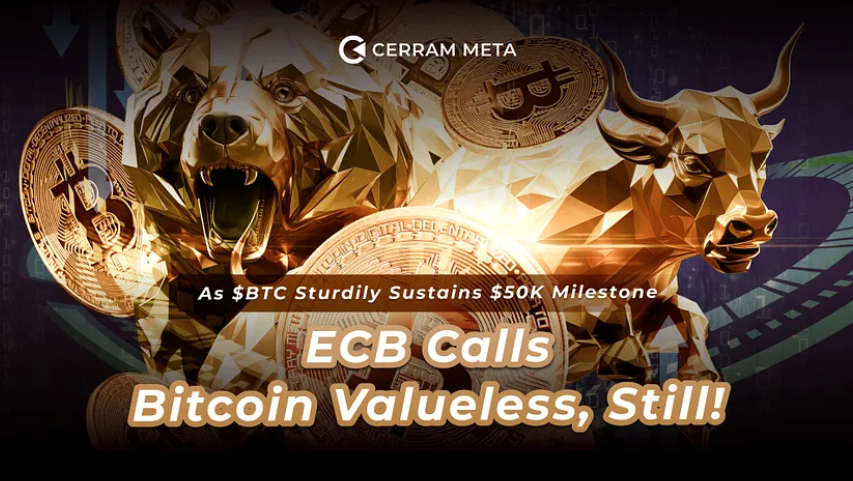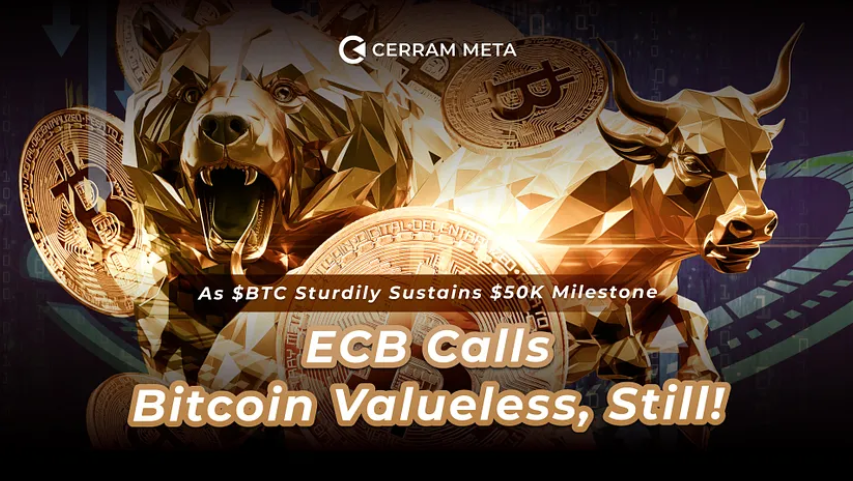$50,000 and Still Climbing, Bitcoin’s Bold Stance amidst ECB’s Zero-Value Claim

Bitcoin’s recent surge past the $52,000 mark has brought the cryptocurrency industry to a significant crossroads.
The cryptocurrency sector is well-known for its dramatic fluctuations, with swift gains often followed by abrupt declines, presenting a complex landscape for investors navigating through these shifting tides. In the midst of this volatility, Bitcoin stands out for its capacity to continually surprise the market with its unpredictable fluctuations.
Bitcoin Breaks $52,000 — A New Era or Another Bubble?
Specialists from ChangeNOW have taken a closer look at this phenomenon, providing an in-depth analysis of Bitcoin’s recent uptick and its implications for the future of digital currencies.
Kate Lifshits, who leads partnerships at ChangeNOW, emphasizes the importance of cautious optimism. She points out that while the excitement around Bitcoin’s price increase is understandable, it is crucial for investors to adopt a pragmatic perspective.
Insider Predictions, Navigating the Peaks and Valleys of Crypto
“The current boost in Bitcoin’s valuation might herald the beginning of a growth phase. Nevertheless, experienced traders are bracing for a potential correction that could bring about a more stable Bitcoin price,” Lifshits suggests.
This cycle of volatility followed by growth has sparked discussions regarding the possibility of a major bullish market trend in the near future, though the exact direction of Bitcoin’s price movement remains to be seen over time.
European Central Bank Throws Cold Water on Bitcoin’s Fire
Adding a layer of controversy to the discourse, the European Central Bank (ECB) has recently asserted that Bitcoin’s intrinsic value is “zero,” expressing a critical view of its viability both as a medium of exchange and as an investment.
In a bold critique, the ECB referenced the U.S. approval of 11 Spot Bitcoin ETFs, likening it to “the naked emperor’s new clothes.” ECB advisors Ulrich Bindseil and Jürgen Schaaf argued that Bitcoin has not lived up to its promise of being a global decentralized digital currency, noting its limited use in legitimate financial transactions.
Bitcoin’s Resilience, Defying Critics and Setting Records
Despite the ECB’s skepticism, Bitcoin has showcased remarkable performance, reaching a two-year high of $52,000 and consistently trading around the $51,000 mark. This success highlights the divergent views on Bitcoin’s value and its potential role in the global financial system.
Critics of Bitcoin who advocate for the efficient market hypothesis yet liken Bitcoin to historical financial bubbles, such as Tulip Mania, find themselves in a paradox. If the efficient market hypothesis posits that market prices are indicative of value, then Bitcoin’s enduring and escalating value signals its significance and utility to investors.
A Market Divided: The Efficient Market Hypothesis vs. Bitcoin Reality
Moreover, the decentralized nature of Bitcoin’s market, operating continuously around the clock, provides all participants with equal access to information regarding its operation. Various metrics, such as the mining hashrate, the number of daily active addresses, and the volume of transactions processed on the blockchain, all demonstrate a consistent pattern of growth, further validating Bitcoin’s value proposition.
Despite the potential for short-term price swings, Bitcoin’s overall performance in terms of return on investment (ROI) and compound annual growth rate (CAGR) significantly outshines many traditional assets. This challenges the binary perspective on investment decisions, suggesting a more nuanced approach to incorporating Bitcoin into diversified portfolios.
The Value Debate: Rethinking What Matters in Finance
The debate over the notion of intrinsic value is particularly pertinent in the context of Bitcoin. The concept of intrinsic value is inherently subjective, contingent upon individual needs and market demand at any given moment.
For instance, the relative value of a luxury item versus a basic necessity can vary dramatically based on the situation, illustrating the principle that demand fundamentally drives value. This timeless concept underscores the argument that Bitcoin’s worth, like that of any other asset, is determined by the market’s collective valuation based on its utility and perceived benefits.
Decoding Bitcoin’s Value: Beyond Speculation to Market Acceptance
Currently, Bitcoin’s journey beyond the $50,000 threshold represents a pivotal moment for the cryptocurrency world, highlighting the ongoing debate surrounding its value, utility, and future role in the financial landscape.
As Bitcoin continues to navigate through periods of volatility and growth, the broader implications for the digital asset sector and the global economy remain an area of keen interest and speculation.
Regards,
Cerram Meta
交易商排行
更多- 监管中EXNESS10-15年 | 英国监管 | 塞浦路斯监管 | 南非监管89.42
- 监管中FXTM 富拓10-15年 |塞浦路斯监管 | 英国监管 | 毛里求斯监管85.36
- 监管中GoldenGroup高地集团澳大利亚| 5-10年85.87
- 监管中金点国际集团 GD International Group澳大利亚| 1-2年86.64
- 监管中Moneta Markets亿汇澳大利亚| 2-5年| 零售外汇牌照80.52
- 监管中IC Markets10-15年 | 澳大利亚监管 | 塞浦路斯监管91.71
- 监管中CPT Markets Limited5-10年 | 英国监管 | 伯利兹监管91.56
- 监管中GO Markets高汇15-20年 | 澳大利亚监管 | 塞浦路斯监管 | 塞舌尔监管87.90
- 监管中alpari艾福瑞5-10年 | 白俄罗斯监管 | 零售外汇牌照87.05
- 监管中AUS Global5-10年 | 塞浦路斯监管 | 澳大利亚监管86.47

